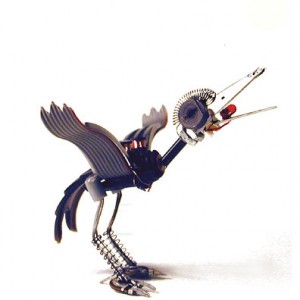To conclude our ‘Birdwatching Wednesday’ special, I recall that a few years ago I was somewhat tickled by a quote from slovenly artist Tracy Emin, as she unveiled a stick with a sparrow on it in Liverpool (funded by BBC licence payers to the tune of £60,000… ah those carefree New Labour days). She warbled: “I’ve always had the idea that birds are the angels of this earth and that they represent freedom.”
I was tickled because “birds are the angels of this earth” struck me as just the sort of thing that Madeleine Basset from the Jeeves and Wooster stories might say, in addition to the stars being God’s daisy chain and that every time a fairy sneezes a wee baby is born.
Now I’m no ornithology expert – I leave that sort of thing to Nige – but it has always seemed to me that the romanticism accorded to birds is wildly misplaced and, close up at any rate, they are vicious, uncanny devils, all robotic or dinosaur-like. Ted Hughes nailed it in Thrushes, from the 1960 collection Lupercal: ‘more coiled steel than living’.
Thrushes is a much-anthologised poem that’s really about writer’s block, as anyone who’s tried to write a blog or anything else will recognise, and well worth reading or re-reading if you’ve not seen it for a while. Like most of Hughes (even including The Birthday Letters), my mood at the time determines whether I find him brilliant or just a little bit absurd. Will his reputation grow or shrink I wonder?
Thrushes
Ted Hughes
Terrifying are the attent sleek thrushes on the lawn,
More coiled steel than living – a poised
Dark deadly eye, those delicate legs
Triggered to stirrings beyond sense – with a start, a bounce, a stab
Overtake the instant and drag out some writhing thing.
No indolent procrastinations and no yawning states,
No sighs or head-scratchings. Nothing but bounce and stab
And a ravening second.
Is it their single-mind-sized skulls, or a trained
Body, or genius, or a nestful of brats
Gives their days this bullet and automatic
Purpose? Mozart’s brain had it, and the shark’s mouth
That hungers down the blood-smell even to a leak of its own
Side and devouring of itself: efficiency which
Strikes too streamlined for any doubt to pluck at it
Or obstruction deflect.
With a man it is otherwise. Heroisms on horseback,
Outstripping his desk-diary at a broad desk,
Carving at a tiny ivory ornament
For years: his act worships itself – while for him,
Though he bends to be blent in the prayer, how loud and above what
Furious spaces of fire do the distracting devils
Orgy and hosannah, under what wilderness
Of black silent waters weep.












The word ‘blent’ seems very alien for some reason. As do birds in general, real little dinosaurs. Although I must say that I find that some ducks seem to have a bit of personality (Orville excepted)
With you on ducks. They’re the nicest birds – dabblers.
Yet swans, on the other hand, are real gits.
…and does anyone actually know if a swan can ‘break your arm’, (as every dad says to every child with glee) or is that one of those strange accepted facts that has no grounding in reality, like not swimming straight after eating……
All dads have to answer difficult questions from their kids (Why doesn’t Tarzan have a beard?) as well as warn them of danger, if they sense it – and swans really are gits (would any sane person go near one? – oh yes, a twitcher would), and should be kept at least at ‘arms’ length. It is said that you are getting like your dad if you ‘put aside a thin piece of wood’. This I can vouch for.
Swans are, like many birds, total gits, but beautiful from a distance, in the water – and they couldn’t break the skin on a rice pudding with their mighty wings, don’t worry – they’re only birds, their bones are like dinking straws. Ted Hughes was also a git and probably could break your arm with a single blow. His poems do indeed tend to be hugely impressive or insufferably dreadful, depending on the angle at which they’re turned to the light. This is not a good sign, and suggests his reputation will diminish – the process is perhaps already under way (though delayed by biographical considerations). Phlip Larkin was a great non-admirer of Hughes and his comments on Crow, somewhere in his letters, are amusingly damning. Larkin also used the word ‘blent’ – but with perfect judgment, as the word to which the poem has been steadily rising – in Church Going.
Fascinating analysis. I’ve always felt that I can appreciate Hughes’ writing but only in theory. “You know, ducks mate for life!” my grandfather always used to tell me with a self-satisfied air (I suspect that his wife might have fancied an affair or two).
Nige, there are enough hugely impressive pieces to keep his reputation secure. Tales from Ovid in particular is one of English literature’s gems. The tragedy of Hughes is that the poems he’d wish to be remembered for will end up being the ones we ignore.